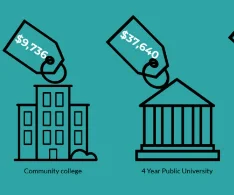With the increasing popularity of community colleges in recent years, many people have started questioning if community college is easier than university.
There’s a lot of uncertainty over whether this is even possible to be an effective route for someone living outside of their home country or what age and income bracket they live under.
This can make it difficult to know where to start when looking at enrolling in a particular course.
Is Community College Easier than University?

The short answer is yes. Community colleges are easier to attend than universities because they offer fewer requirements and smaller classes.
You can take more classes, study more hours, and get your degree faster at a community college than at a university.
Community colleges also typically offer lower tuition rates than universities, making it easier for students to pay for their education.
Universities tend to focus on higher-level courses and research, while community colleges often focus on teaching skills and knowledge used in everyday life. This makes them better suited for some students who want an education but don’t want to spend four years in college.
Is it easier to Pass with a 4.0 GPA than at University?
The short answer is that it depends on your situation. If you are applying to an undergraduate program (whether university or college), the four-point GPA could help you get into your preferred programs.
If you don’t meet the minimum required scores, then you might not get accepted into your desired program.
However, if you are applying for postgraduate programs, other factors like GRE scores and requirements also come into play.
Can Community College be the same as a University?
University and college are two different things. University is a higher education institution where you can study for a degree or diploma.

College is an organization that offers various academic programs for students who want to learn more about their future careers and life. This feature make community colleges worth it to every student to study there.
Community colleges are the same as universities in many ways, but some differences exist.
Community colleges provide career-oriented education and training for working adults, while universities focus on general education, such as liberal arts and sciences, humanities, engineering and other technical fields.
Pros and cons of Community College Vs University
Pros
- Free: Community colleges are often free and do not charge tuition. University tuition varies but is still high compared to community college tuition.
- Location: Many community colleges are located right in your town or city, so you can be home after classes if you want to. Universities can be thousands of miles away from home, so it’ll take longer if you need to get back and forth between classes.
- Favorite Classes: Community college classes are usually more hands-on than university classes. They will focus on things that interest you the most and allow for more flexibility than a university course.
- Lower tuition costs: Community colleges cost less than universities, many students are able to pay for their education. The average cost of tuition at a four-year public university is $8,000 per year. Meanwhile, the average cost of tuition at a community college is $3,000 per year.
Cons
- Length of program: Some community college programs are longer than four years, and some even require additional time for graduation requirements, so check out the length of each program before deciding if it’s right for you!
- Financial aid opportunities vary by school, so speak with financial aid officers at each institution before enrolling-they can help guide you through the process!
- Community colleges may not be as high-quality as universities. You might not be able to get into your dream program at a community college if you’re applying for it out of high school, so you’ll have to take some extra steps to get there.
Courses Ideal for University
If you are looking to study at university, the courses below will give you the skills you need to start a successful career in your chosen field.

1. Computer science
A degree in computer science is a great way of getting into your dream job as it provides a broad knowledge of IT and programming.
Computer science degrees are available at many universities and colleges, including Bournemouth University, Bangor University and Leeds University.
2. Hospitality management
If you want to work in the hospitality industry, then a hospitality management degree is the best way to achieve this.
You’ll learn about food and drink, customer service, marketing, accounting and many other areas related to the industry – making you well-equipped with all of the necessary skills for starting a career in this field.
3. Marketing
Marketing is one of the most widely recognized careers in modern society due to its crucial role in shaping consumer habits.
A degree in marketing allows students to develop their business skills by studying advertising campaigns or marketing strategies as well as providing an understanding of how consumers think about products and services.
4. Business Studies
Business management is one of the most popular courses in universities. It helps you gain knowledge about the basics of business and how it works. You can also learn about other related topics such as accounting and marketing.
Another thing worth mentioning is that a degree in business management can help you land a job easily after graduation.
5. Psychology
A psychology degree can help you understand human behavior and behavior patterns, a crucial skill when working in any industry or field that requires knowledge about human behavior or psychology.
6. Mathematics

This course is ideal for those who want to study mathematics and physics. The subject includes basic algebra, geometry, trigonometry and calculus.
It also includes probability theory, linear algebra and number theory.
7. Physics
There are many courses available in physics, such as combustion engines, thermodynamics, electromagnetism and nuclear physics, among others.
The most popular one is atomic physics because it deals with the most basic parts of matter like atoms which are also called subatomic particles or elementary particles like electrons, protons or neutrons etcetera
8. Law
If you wish to study law and possibly become a solicitor or barrister, this may be the best course to follow.
Law courses are offered at many universities across the country and can help you gain a competitive advantage over other applicants with similar qualifications.

